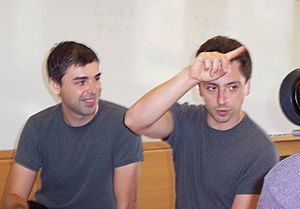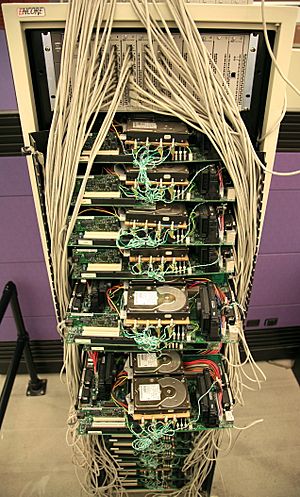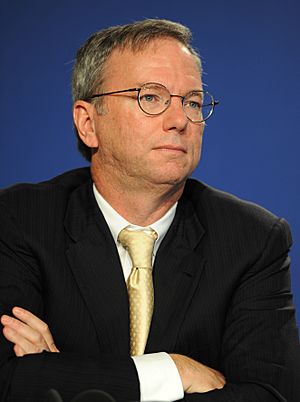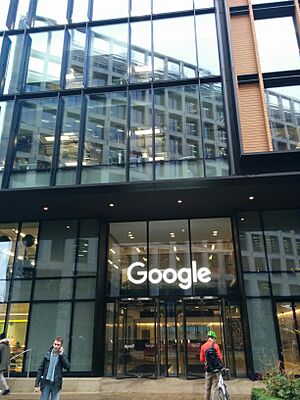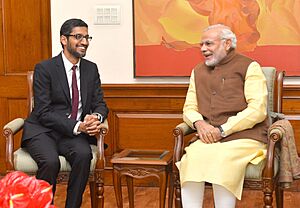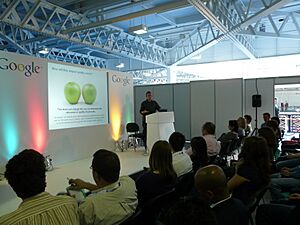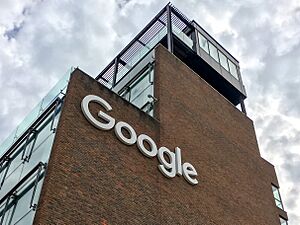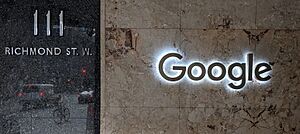Google facts for kids
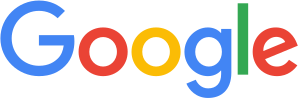
The Google logo used since 2015
|
|||
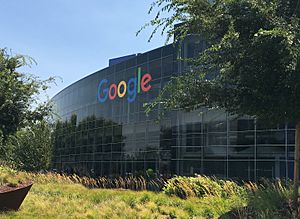
Google's headquarters, the Googleplex
|
|||
|
Formerly
|
Google Inc. (1998–2017) | ||
|---|---|---|---|
| Subsidiary | |||
| Traded as | |||
| Industry | |||
| Founded | September 4, 1998 in Menlo Park, California, United States | ||
| Founders | |||
| Headquarters | Googleplex,
,
U.S.
|
||
|
Area served
|
Worldwide | ||
|
Key people
|
|
||
| Products | |||
| Parent | Alphabet Inc. | ||
| Subsidiaries | |||
|
|||
Google LLC is a huge American technology company. It focuses on things like online ads, search engines, and artificial intelligence (AI). Many people call it one of the most powerful companies in the world. Google is part of a bigger company called Alphabet Inc.. Alphabet is one of the five largest tech companies, along with Amazon, Apple, Meta, and Microsoft.
Google was started on September 4, 1998. Two computer scientists, Larry Page and Sergey Brin, created it. They still own a lot of the company. In 2015, Google became a part of Alphabet Inc. Google is the biggest part of Alphabet. Sundar Pichai became the CEO of Google in 2015. He also became the CEO of Alphabet in 2019.
Google started with its famous search engine, Google Search. Since then, it has grown a lot. It now offers many different products and services. These include email (Gmail), maps (Maps), web browsing (Chrome), and video sharing (YouTube). Google also makes phone software (Android) and smart home devices (Nest). Many of Google's products are very popular in their areas. Google Search and YouTube are two of the most visited websites in the world.
Contents
History
Google started as a research project in January 1996. Larry Page and Sergey Brin were PhD students at Stanford University in California, USA. They wanted to find a better way to search the internet.
How Google Started
Most search engines at the time ranked websites by how many times a search word appeared. Larry and Sergey thought of a new system. It would look at how websites were connected to each other. They called this idea PageRank. It decided how important a website was by counting how many other important pages linked to it.
They first called their search engine "BackRub." This was because it checked "backlinks" to websites. Later, they changed the name to Google. This name came from a misspelling of the word googol. A googol is a very large number: 1 followed by 100 zeros. They chose this name to show that their search engine would provide huge amounts of information.
Google got its first big investment in August 1998. Andy Bechtolsheim, a co-founder of Sun Microsystems, invested $100,000. This helped them officially start the company. Other early investors included Jeff Bezos, who founded Amazon.com. With money from investors, friends, and family, Google raised about $1,000,000. This allowed them to open their first office in Menlo Park, California. Craig Silverstein, a fellow student, became Google's first employee.
Growing Bigger
In March 1999, Google moved its offices to Palo Alto, California. This area is known for many tech companies. The next year, Google started selling ads linked to search words. These ads were only text-based to keep the page simple. In June 2000, Google became the main search engine for Yahoo!, which was a very popular website then.
In 2003, Google moved to a larger office complex in Mountain View, California. This place became known as the Googleplex. The name is a play on "googolplex," which is an even bigger number than a googol. By this time, "Google" became a common word. The verb "google" was added to dictionaries. It means "to use the Google search engine to find information on the Internet."
In 2001, Google's investors wanted a strong leader. They hired Eric Schmidt as the CEO. He helped guide the company's growth.
Becoming a Public Company
On August 19, 2004, Google became a public company. This means its shares could be bought and sold by anyone. The company offered shares at $85 each. This sale raised $1.67 billion and made Google worth over $23 billion.
Google continued to grow by buying other companies. In October 2006, Google bought YouTube for $1.65 billion. YouTube is now one of the most popular video sharing sites. In May 2012, Google bought Motorola Mobility for $12.5 billion. This helped Google get many patents for mobile phones.
Recent Years
In June 2013, Google bought Waze for $966 million. Waze is a popular navigation app. Its features, like crowd-sourced traffic info, helped improve Google Maps. In January 2014, Google bought DeepMind Technologies, an AI company from London. This helped Google grow in the field of artificial intelligence. DeepMind's AlphaGo program later became the first computer to beat a top human player at the game of Go.
On August 10, 2015, Google announced a big change. It reorganized its different parts into a new company called Alphabet Inc. Google became the largest part of Alphabet. Sundar Pichai became the CEO of Google.
In March 2019, Google announced it would enter the video game market. It launched a cloud gaming platform called Google Stadia. In October 2020, Google faced a lawsuit in the US. It was accused of having too much control over the search and search advertising markets.
In April 2020, during the COVID-19 pandemic, Google made some changes. It slowed down hiring and reduced spending in some areas. Many employees also started working from home. In 2021, the Alphabet Workers Union was formed by Google employees.
In 2022, Google started allowing people to ask for their phone numbers, addresses, and email addresses to be removed from search results. This was a new step for privacy. In December 2022, Google released OSV-Scanner. This tool helps find security problems in open source software.
In March 2023, Google released Gemini, a new generative artificial intelligence chatbot. This was in response to the fast growth of other AI chatbots. In August 2024, a US court found that Google had an illegal monopoly over internet search. In September 2024, a European court also found Google had an illegal monopoly related to shopping search.
In November 2024, Google announced a new AI hub in Saudi Arabia. This hub aims to help Saudi Arabia's economy grow and improve its technology. In March 2025, Google agreed to buy Wiz, a cybersecurity company, for $32 billion. This was Google's biggest purchase ever. In July 2025, the US Department of Defense gave Google a $200 million contract for AI in the military.
Products and Services
Google offers many different products and services. They help people with many daily tasks.
Search Engine
Google's main product is its search engine. It looks through billions of web pages. This helps users find the information they want by typing in keywords. Google Search is the most used search engine in the world.
Google also has Google News, which summarizes news articles. Google Books lets you search inside books. Google has also expanded its search services to include shopping, finance, and flights.
Advertising
Most of Google's money comes from advertising. This includes ads on Google and YouTube. It also comes from apps and digital content. Google uses special technology to show ads that might interest you. For example, Google Ads lets businesses show their ads on Google. Google AdSense lets website owners show these ads and earn money.
Google Analytics helps website owners understand how people use their sites. Google Search Console helps website owners check their site's health and how visible it is in search results.
Artificial Intelligence
Google has been working on artificial intelligence (AI) for a long time. In March 2024, Google announced Gemini, a powerful AI chatbot. Google also created Imagen, which makes images from text. It also created Veo, which makes videos from text.
In 2025, Google announced SynthID Detector. This tool uses special watermarks to tell if content like text, images, or videos was made using Google's AI products. Google also developed LearnLM, which are AI tutors to help people learn.
Services for People
Web-Based Tools
Google offers many useful tools online. These include:
- Gmail for email.
- Google Calendar for planning your time.
- Google Maps and Google Earth for maps and satellite pictures.
- Google Drive for storing files online.
- Google Docs, Sheets, and Slides for creating documents, spreadsheets, and presentations.
- Google Photos for storing and sharing photos.
- Google Keep for taking notes.
- Google Translate for translating languages.
- YouTube for watching and sharing videos.
- Google Classroom for managing school assignments.
Software
Google makes the Android operating system for phones. It also makes versions for smartwatches (Wear OS), TVs (Android TV), and cars (Android Auto). Google also develops the Google Chrome web browser. It also makes ChromeOS, an operating system for laptops called Chromebooks.
Hardware
Google has made its own phones and other devices. In 2010, Google released the Nexus One, its first Android phone. This led to the "Nexus" line of phones and tablets. In 2016, Google replaced Nexus with a new brand called Pixel.
In 2011, the Chromebook was introduced. These laptops run on Google's ChromeOS. In 2013, Google released the Chromecast. This small device lets you stream content from your phone to your TV.
Google also makes smart home devices under the Nest brand. These include smart speakers that can answer questions, play music, and control other smart devices. Nest Wifi helps extend Wi-Fi coverage in homes.
Services for Businesses
Google Workspace (formerly G Suite) is a monthly service for businesses. It gives them access to Google tools like Gmail and Google Drive. It also includes special tools for businesses.
Google also has Google Cloud Platform. This provides powerful computing services for businesses and developers.
Internet Services
In 2010, Google announced Google Fiber. This project aimed to build very fast internet networks in some US cities. In 2015, Google launched Project Fi. This mobile phone service combines Wi-Fi and cellular networks for better connection.
Where Google Works
Google's main headquarters is in Mountain View, California. It's called "the Googleplex." Google has over 78 offices in more than 50 countries around the world.
In 2006, Google opened a large office in New York City. This office has its biggest team for selling ads. In 2010, Google bought the building. In 2018, Google bought another nearby building called Chelsea Market. Google plans to expand its New York City offices even more.
Google also has offices in many other US cities. These include Ann Arbor, Michigan, Pittsburgh, Atlanta, Austin, and Seattle. Around the world, Google has research and development offices in places like Sydney (where Google Maps was created) and London. In 2015, Google announced plans for a new campus in Hyderabad, India. This will be one of its largest offices outside the US.
Caring for the Environment
Google works to be environmentally friendly. In 2006, it installed thousands of solar panels at its headquarters. These panels provide a lot of electricity for the campus. Google aims to be carbon neutral in its operations. This means it tries to balance the carbon it releases with the carbon it removes.
In 2009, Google even hired a herd of 200 goats to mow its lawn. This was a more eco-friendly way to cut the grass. Google has also invested in renewable energy projects. For example, it has put money into wind farms.
In December 2016, Google announced that it would buy enough renewable energy to match 100% of the energy used by its data centers and offices. This made Google the world's largest company buyer of renewable power. In September 2019, Google announced a $2 billion investment in wind and solar energy.
In September 2020, Google said it had offset all its carbon emissions since it started in 1998. It also promised to use only carbon-free energy for its data centers and offices by 2030.
Helping Others
In 2004, Google started a non-profit group called Google.org. It began with $1 billion. This group works to raise awareness about climate change, global health, and poverty. One of its first projects was to develop a car that could get 100 miles per gallon.
In 2008, Google launched "project 10100." This project asked for ideas to help the community. Google users voted on their favorite ideas. Google then gave a total of ten million dollars to different projects. These included groups that promote education and a website to make legal documents public.
After the events in Ukraine in 2022, Google donated $15 million to help Ukrainian citizens. It also turned its office in Warsaw into a help center for refugees. In February 2022, Google announced a $100 million fund. This fund helps low-income Americans get skills training and jobs.
Fun Facts About Google
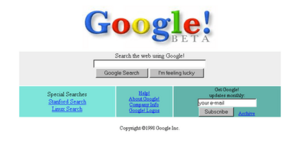
- Google and YouTube are the two most visited websites in the world.
- Google is the biggest search engine. It's also the largest mapping, email, and online video platform. It's also the top mobile operating system and web browser.
- Google is ranked as one of the most valuable brands globally.
- Google was first called "BackRub." This was because it checked "backlinks" to see how important a website was.
- The name "Google" comes from a misspelling of "googol." A googol is the number 1 followed by 100 zeros. This name was chosen to show that the search engine could provide a huge amount of information.
- The word "google" was added to dictionaries in 2006. It means "to use the Google search engine to find information on the Internet."
- Google often creates April Fools' Day jokes. In 2000, they announced "Google MentalPlex." It supposedly let you search the web using your mind.
- Google's services have "easter eggs." These are hidden jokes or features. For example, you can change the search engine language to Swedish Chef's "Bork bork bork."
- If you search for "anagram," Google's suggestion is "Did you mean: nag a ram?" This is a clever play on words.
- Google has data centers in North America, South America, Asia, and Europe.
See also
 In Spanish: Google para niños
In Spanish: Google para niños
- Outline of Google
- Googlization
- Google ATAP
 | Janet Taylor Pickett |
 | Synthia Saint James |
 | Howardena Pindell |
 | Faith Ringgold |


